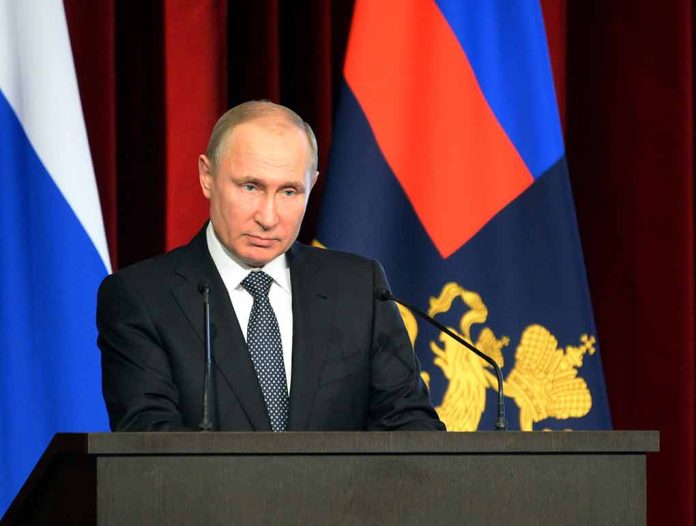
Russia’s unexpected decision to rescind the Taliban’s terrorist status reshapes geopolitics with ramifications for international relations.
Key Takeaways
- Russia’s Supreme Court has removed the Taliban from its list of terror groups.
- This decision is part of Russia’s strategy to strengthen ties with Afghanistan.
- Immediate lifting of the terror ban was confirmed by state-run Tass news agency.
- The Taliban’s pursuit of international legitimacy remains a contested issue.
- Trade opportunities may emerge between Russia and Afghanistan.
Russia Rescinds Taliban’s Terrorist Designation
Russia’s Supreme Court has lifted the Taliban’s 22-year-long terrorist designation. This crucial decision is effective immediately, according to a statement reported by the state-run Tass news agency. This move aligns with Russian President Vladimir Putin’s and lawmakers’ efforts to reframe Russia’s relations with Afghanistan, potentially paving the way for budding economic partnerships.
The Taliban’s presence on Russia’s terrorist list dates back over two decades. This removal marks a significant turning point, embodying Moscow’s attempt to mend past differences rooted in the Soviet Union’s decade-long conflict in the region. The court’s decision is described as a “win-win” for both Russia and Kabul, enhancing Russia’s regional influence and potentially assisting in addressing anti-Kremlin terror groups.
Potential Implications for Afghanistan-Russia Relations
The Taliban seeks increased international engagement, aiming to legitimize their rule despite existing controversies over their strict implementation of Islamic law. Under Taliban control, Afghanistan faces international isolation due to severe restrictions, particularly on women and education. This isolation complicates the Taliban’s efforts to align more closely with nations like Russia.
The Taliban have implemented strict shariah law, restricting women’s rights and enforcing harsh legal measures. Such policies hinder potential partnerships and complicate the Taliban’s aspirations for international acceptance, reshaping the dynamics of global diplomacy and foreign policy.
Geopolitical Ramifications
Russia’s decision aligns it with a contentious regime, prompting international debate over the Taliban’s legitimacy. Russia could leverage this new dynamic to position itself as a primary influencer in Central Asia, potentially challenging Western powers’ influence in the region. This action opens channels for trading opportunities, impacting sectors like energy and transport.
“Meanwhile, for the Taliban, the court decision is a legitimacy-boosting outcome they can leverage to point to international acceptance of their rule,” said Michael Kugelman.
As Russia deepens ties with the Taliban, the global community watches closely, weighing the implications for international law and regional stability in Central Asia. While Moscow extends a degree of recognition to the Taliban, other nations grapple with the repercussions, balancing strategic interests against the Taliban’s controversial governance.




